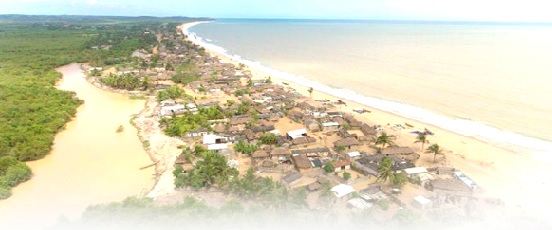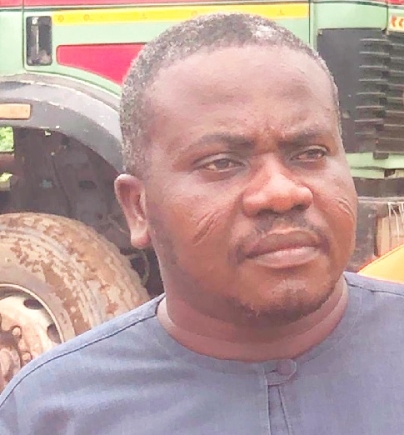
Shama: Untapped industrial pot
The Shama Constituency in the Western Region, a fishing community endowed with natural resources, has become one of the biggest energy hubs supporting the country’s efforts towards industrialisation.
The constituency boasts power plants such as the Volta River Authority (VRA) Thermal Plant 1, Thermal Plant 2 and Thermal Plant 3, the Takoradi International Company (TICO), now TAQA, Amandi, among others.
It also hosts the metering station of the Ghana National Gas Company (Ghana Gas), the termination and export point of the West African Gas Pipeline (WAPCo) which transports gas from Itoki in Nigeria to Takoradi, and the reverse flow facility transmitting gas from the Western Region to the Tema enclave in the Greater Accra Region.
Shama is one of the 16 constituencies in the Western Region, dominated by the National Democratic Congress (NDC) and the New Patriotic Party (NPP).
Currently, the parliamentary seat is occupied by the NPP’s Samuel Erickson Abakah, who beat the then incumbent NPP MP in the internal contest before going on to win the seat in the 2020 general election.

Samuel Erickson Abakah, MP for Shama
Even though the constituency plays host to a lot of companies in the energy and ceramic industries, the people complain that development in general is yet to meet their expectations, citing infrastructure in education, roads and health as prominent areas of their immediate needs.
The constituency’s roads stretch up to 93.6 kilometres, out of which 82.8km are engineered, with 65.20km gravelled or unpaved, 24.70km with bitumen or paved surfaces, 5.8km partially engineered, with a five-kilometre stretch with clay surface not engineered.
These roads are, however, not in their best conditions.

A deplorable road
The constituents say the road sector remains a major challenge, citing the link between Shama Apo and Aboadze along the coast and the road linking Shama to the main junction.
In the first week of July, the acting Paramount Queenmother of the Shama Traditional Area, Nana Akosua Gyamfiaba II, dressed in red asafo regalia, led the people of Shama to demonstrate for hours over the deplorable roads and abandoned projects.
The demonstrators blocked the main entrances of roads to settlements and companies at Nyankrom, Aboadze and Shama, causing traffic congestion and inconvenience to workers and commuters.
The demonstrators asked why the communities that were hosts of important national installations such as the thermal power units and ceramic companies which received hundreds of heavy-duty trucks on a regular basis had their roads unattended to.
The acting queenmother said the condition of the roads made it difficult for the sick, pregnant women and the aged to access health care.
“The fact is that due to the nature of the roads, commercial vehicles will not even ply them, and those who want to risk it will charge exorbitant fares,” she said.
Drivers said although there was a contractor supposedly working on some roads, they could not tell exactly what was happening, and that they felt neglected.
Roads through Abuesi, Nyankrom, Shama Apo, Bentre and Aboadze, and then from the popular Shama Junction towards Konfoeku are in a deplorable state, which some residents said would not attract investors to the community even though they were located along the beautiful coast in the constituency.
Health
In the area of health infrastructure, the constituency has about 22 Community-based Health Planning Services compounds located within all the 17 electoral areas.
The district assembly said 18 of the 22 were fully functional, with one of them upgraded to the status of a health centre, while four were not under proper structures.
However, the construction of a district hospital, for which a sod-cutting event was held in 2020, is yet to take off.
The site has been abandoned ever since it was cleared for the ceremony.
DCE’s response
The Chief Executive of the Shama District Assembly, Ebenezer Dadzie, told the Daily Graphic that the government was doing everything possible to upscale the development of the area.

Ebenezer Dadzie — DCE for Shama
The road infrastructure, he acknowledged, had some deficit that the government was working on, and that the pace might be slow but the government was doing everything possible to fix it.
Industrial Shama
The Shama Constituency also hosts the various switchyards and the 250-megawatt (MW) Africa and Middle East Resource Investment (AMERI) Thermal Power Plant and a well-structured VRA community at Aboadze.
With the emergence of the upstream oil and gas companies, the constituency also hosts a wholly owned Ghanaian oil and gas waste management companies, namely the Zeal Environmental Technologies Limited and Zoil Ghana, the Twyford Ceramics Factory and warehouses.

Ghana Gas Metering station in the Shama District
The constituency has an appreciable land bank for investors under the country’s Free Zones Enclave.
The host Shama District, one of the 14 districts in the Western Region, was carved out of the former Shama Ahanta East Metropolitan Assembly, with Shama as its administrative capital.
Apart from the industrial interest, agriculture plays a vital role in the socio-economic development of the Shama District as more than 35 per cent of the district’s population are engaged in agriculture, with the economically active population aged between 15 and 64 years.
The agronomy sector which comprises crops, livestock, fisheries, agroforestry and non-traditional commodities and crop farming and fishing accounts for about 92.7 per cent of the district’s businesses.
The 2021 population and housing census conducted by the Ghana Statistical Service estimated the population of the Shama District as 112,875, with a growth rate of 3.2 per cent.
Natural resources
The Shama Constituency is blessed with natural resources, water bodies, a long stretch of coastline with dotted islands in the shallow waters, quarries and large deposits of high-grade clay for ceramics, which in recent times have attracted investors in the ceramic industry.
The emergence of ceramic factories in the area to absorb the rich clay deposits came as good news to constituents who might have seen the potential of it to create jobs and wealth for the people.
However, that dream is threatened by the unstructured and unregulated clay and sand-winning activities that affect the environmental safety, roads and the health of the people.

West African Gas Pipeline Company regulation and metering station in the Shama District
The unguarded exploitation without permit has left the communities in the district with many abandoned pits, streets inundated with sediments of clay droppings from trucks.
The constituency is also endowed with various mineral deposits, including gold, salt, kaolin-clay and granite, which currently remain the most exploited.
Pra River
The residents along the coast of Shama tell lovely tales about the Pra River that flows through the community but claim that due to greed, the river body has become a curse.
The illegal mining activities, commonly called galamsey, have heavily polluted the river, threatening its aquatic life.
Debris from the heavily polluted Pra River, as a result of illegal mining activities, has changed the colour of the river, while the shore is left unattractive to tourists and even members of the communities.
Shama, which is endowed with a beautiful coastline, an estuary and a long Ramsar site towards the estuary, creates a perfect ambiance for all manner of birds and serves as a breeding ground for fish species, but is now muddy and unkempt.
Until now, Shama was known more for quarry and agriculture (farming and fishing) than illegal mining, but now its coast is suffering the effect of galamsey at the estuary.
Residents say the situation is denying them the needed investment, as investors who have bought land in the area to develop into beach resorts appear to be shying away.
They blame the situation largely on the inability of the duty bearers to clamp down on illegal mining to free the coast of the destructive activities.
Places to remember
The constituency has interesting names such as Antsembua, literally translated as “If I did not hear, I don’t respond”; Obinimokyina, meaning “nobody knows tomorrow”; Asem Asa, which translates as “end of story”; Aboadze, Abuesi, Inchaban, Shama, Shama Junction, Assorkor-Essaman and Supomu-Dunkwa, and Ohiamadwen.
It also has the Anlo Village, a unique settlement of people from Anlo in the Volta Region.
Situated towards Komenda in the Central Region, the community appears to have, however, lost the beauty of the natural deep blue sea due to sea erosion.
The incessant illegal mining activities in the Pra River, which joins the sea at Anlo Village, has polluted the entire coastline, affecting aquatic life in the waters.
Some residents who spoke to the Daily Graphic during a tour said water from the Pra River was once fresh and clean and served as a source of drinking water for the riverine communities.
The Pra River, the residents complained, is now muddy due to illegal mining activities.
The situation has left a lot of tourism potential in the area yet to be harnessed to create wealth and jobs.
Even though the coast along the area is relatively serene, it has limited hospitality facilities to attract visitors.
